| Srl | Item |
| 1 |
ID:
162449
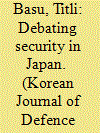

|
|
|
|
|
| Summary/Abstract |
Since the post–war era, understanding Japan’s security rhetoric and actions
presented certain incongruities. While the constructivist arguments underscore that
the influence of post–war antimilitarist norm shaped Japan’s security behavior, it
contradicts the realist underpinnings influencing Japan’s choices. To understand
Japanese post–war security orientation and comprehend the rapidly unfolding policy
shift, this paper explores three sets of questions: firstly, what are the competing
schools of thought in the Japanese security debate? What are their core arguments
on key issues including Article 9 of the Constitution, potency of the Self–Defense
Forces (SDFs), nature of the U.S.–Japan alliance and historical narratives of Japan’s
past? What are the inter-school and intra-school fault lines? Secondly, what are the
drivers that propelled the dominance of each school at different time frames? How
does the factional power struggle in the domestic political landscape enable each
school to maximize their space and influence in the current security discourse?
More specifically, why did mercantilists remained the dominant political force
throughout the Cold War? In contrast, what led to normalists gaining momentum
and substituting mercantilism as a potent force in the post–Cold War period?
Thirdly, how have political elites pursued their competing agendas and critically
analyze the case of Shinzo Abe? What are the influences that shaped his values?
What are the methods he employed to pursue his ambitions of making Japan a
“normal” nation? And how did he consolidate his political strength and manage to
realize concrete policy objectives?
|
|
|
|
|
|
|
|
|
|
|
|
|
|
|
|
| 2 |
ID:
143352


|
|
|
|
|
| Summary/Abstract |
East Asian theatre is fast evolving. China’s arrival as a major power in international politics is altering the existing regional balance of power and intensifying Japan’s quest for securing a rightful place in the international system. Japan is reacting to the asymmetrical power politics and Shinzo Abe is increasingly becoming restless in attempting to redefine Japan’s secondary power identity. This requires undoing the limitations that were forced on Japan in the post-war period, including the constitutional restrictions, especially the pacifist clause. Amid fiercely contested domestic debate, reinterpreting the pacifist constitution is certainly a bold step towards infusing clarity in Japan’s future security role. The key objective is to convey to Japan’s allies concerning the manner the SDF will cooperate with the US and other regional powers, such as Australia, India, Philippines, etc. How this ‘limited’ right to collective self-defence will translate into operation will remain to be seen. To understand the rapidly unfolding policy shift, it is imperative to understand the different waves of the debate on collective self-defence and deconstruct the recent cabinet decision; explore the arguments of the competing schools of thought in Japan; examine the nuances and drivers that propelled Japan to redefine its passive constitution; and understand how regional and extra-regional powers evaluate this policy reorientation. Few regional stakeholders raised an alarm over the approach adopted by Abe to achieve the policy objective underscoring his militarist ambitions. While the aggressive historical baggage has caused considerable unease, it is premature to be alarmed over Japan’s shifting security posture as possible re-militarisation is unlikely to represent the traits of Imperial Japan.
|
|
|
|
|
|
|
|
|
|
|
|
|
|
|
|
| 3 |
ID:
163384
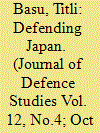

|
|
|
|
|
| Summary/Abstract |
Three key developments unfolded in Japan in August 2018: the Ministry of Defence (MOD) released its annual Defence White Paper; requested a 2.1 per cent increase in the 2019 budget; and instituted an Exploratory Committee on the Future of Self Defence Forces (SDF) with the objective of reviewing the current National Defence Program Guidelines (NDPG) and the Mid-Term Defence Program (MTDP). The subsequent consolidation of political strength in September 2018 at the Liberal Democratic Party’s (LDP) presidential election extended Prime Minister Shinzo Abe’s tenure till 2021. Analysing these developments in the backdrop of Prime Minister Abe’s top priorities—managing the United States (US)-Japan alliance under the Trump Presidency and delivering on the ‘great responsibility’ of redefining Japanese post-war security orientation—unpacks Tokyo’s key challenges. These are, essentially, balancing between sharing greater burden within the alliance framework to ensure regional security on one hand, and weighing regional sensitivities and deeply fractured domestic constituencies on the other.
|
|
|
|
|
|
|
|
|
|
|
|
|
|
|
|
| 4 |
ID:
152902
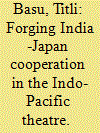

|
|
|
| 5 |
ID:
146852


|
|
|
|
|
| Contents |
Japan’s long-standing alliance with the US is the key feature of its defence and security policy. However, China’s rise and impact on shaping the regional security architecture, and the vigour of US commitment in the backdrop of a G2 formulation, is making Japan diversify her options. Thus, India now features in the Japanese idea of Asia while it struggles to cope with the fluidity of the regional security landscape. This article critically analyses the increasing space accorded to India and the variables behind Japan’s courtship of it. It probes whether Japan’s India policy is Abe centric, or more enduring in nature, and examines India’s position in Japan’s defence outlook as Tokyo redesigns its security policy. India’s advent in the Japanese geo-strategic frame will endure since the variables that pushed Japan to incorporate India in its strategic design will mature and complicate the regional security environment in the coming years.
|
|
|
|
|
|
|
|
|
|
|
|
|
|
|
|
| 6 |
ID:
143997


|
|
|
|
|
| Summary/Abstract |
India’s Act East policy and Prime Minister Modi’s Make in India drive coincide with the shifts in the Japanese post-war security policy and the April 2014 easing of the self-imposed arms export ban. Departure in Japan’s policy position on transfer of defence equipment and technology has raised India’s hopes about new vistas of high-end defence technology cooperation.
|
|
|
|
|
|
|
|
|
|
|
|
|
|
|
|
| 7 |
ID:
136786


|
|
|
|
|
| Summary/Abstract |
Evolving geopolitical realities are shaping the India-Japan relationship. While the ‘China threat’ theory and declining US influence in the region is making Abe explore alternatives like India, India is expected to pursue its quest for multi-polarity, great power identity, as well as pragmatically engage with all the important players in the fast altering security environment to ensure regional peace and stability so critical for facilitating development. Japan is vital in India’s Look East, Engage East, and Act East policies. Shared values and a convergence of interests in the post-Cold War era, as discussed earlier, has pushed the relationship from one of mutual reluctance to deep-rooted trust and cooperation.
|
|
|
|
|
|
|
|
|
|
|
|
|
|
|
|
| 8 |
ID:
163992
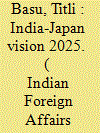

|
|
|
| 9 |
ID:
188783
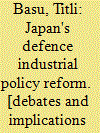

|
|
|
|
|
| Publication |
New Delhi, MP-IDSA, 2023.
|
| Description |
123p.pbk
|
| Series |
MP-IDSA Monograph Series no; 79
|
| Standard Number |
9788195395774
|
|
|
|
|
|
|
|
|
|
|
|
Copies: C:2/I:0,R:0,Q:0
Circulation
| Accession# | Call# | Current Location | Status | Policy | Location |
| 060314 | 338.47355052/BAS 060314 | Main | On Shelf | General | |
| 060315 | 338.47355052/BAS 060315 | Main | On Shelf | General | |
|
|
|
|